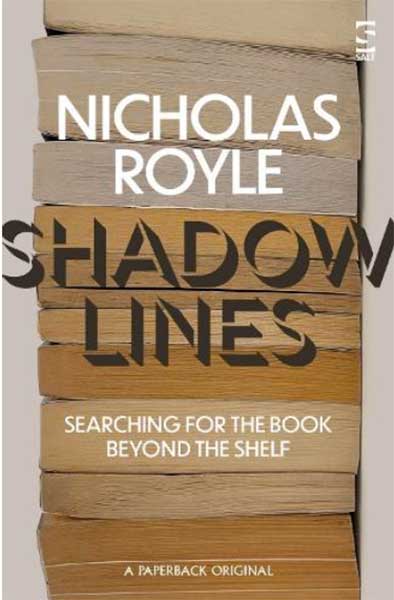
Shadow Lines, Nicholas Royle (Salt)
So this is the book I thought I was getting when I got (the other) Nicholas Royle’s book which I previously reviewed here. This is a book about (this) Royle’s obsession with books, a follow-up to White Spines: Confessions of a Book Collector, which was a marvellous story documenting the author tracking down the white-spined Picador books he had started collecting, something which to a certain extent Shadow Lines continues.
But only to a certain extent. Whilst this book continues to document Royle’s national and international secondhand bookshop and charity shop visits, it is also about – as the subtitle puts it – him ‘Searching for the Book Beyond the Shelf’. What this means in practice is that Royle gets a free pass to include asides and tangents and other obsessions to do with books. There’s a chapter (‘Three Reminiscences’) about departed writer friends, an almost conspiratorial chapter on the links between the illustrations in the Thomas the Tank Engine books and Surrealist art, and a final chapter both deconstructing Paul Auster’s The New York Trilogy and trying to explain – to himself and readers – why he has bought and kept so many secondhand copies.
This is all done in a friendly, almost chatty, engaging manner, with the overall tone of a pub dialogue or intimate conversation: highly readable and entertaining. However, other chapters get weirder. I am totally at a loss to understand how or why Royle reads as he walks along, though I do understand the fact that many people feel able to comment on his strange habit. I mean, I read on public transport and when sitting or standing still, but just how many lamp posts or people has Royle walked into whilst traversing London, Manchester and elsewhere? I think that we need to know, although Nicholas Royle’s Bumps and Bruises may, of course, be the next book in this series.
Let me explain my confusion further. Like the author, I collect books, but only because I wish to read them. I may have piles of unread books on the stairs up to my study, but my intentions are honourable (honest). It is unclear however if Royle buys books to read or simply because he needs them to fill specific gaps in his collections of books from specific publishers. And what’s really strange is he often buys secondhand titles because of the ‘shadow lines’, which indicate the inclusion of something else within the book. I always welcome a bookmark or postcard in my book purchases (I found $4 tucked into one yesterday), but no, Royle wants ticket stubs, dry cleaning tickets, receipts or other personalised matter; he also likes inscriptions, names and annotations, whereas I detest books marked up in this way (not to mention ex-library books). We do, however, seem to share a mutual dislike of page corners folded over.
Anyway, each to their own, but Royle often starts tracking down previous owners or the inscribers of handwritten dedications before contacting them and/or sometimes returning to the book to them. It reminds me of a young art teacher, fresh-faced from teacher training college, trying to explain to a class of bemused 12 year olds (including me) how a parcel sent to a non-existent address before being returned to sender, then wrapped up again and sent to another non-existent address before being returned to sender, etc. etc., was art. (Now, of course, I love that idea!) Why would anyone contact strangers in this way? Or buy books just to do this? Or keep notebooks full of what he found in what books and where he purchased them? I mean, I have notebooks listing everything I have read for the last 50 years, but surely that’s completely different? And not at all obsessive.
Okay. Moving on, what underpins this wonderfully absurd book is Royle’s encyclopaedic knowledge of secondhand bookshops and charity shops around the country, perhaps the world. I thought I had a nose for such things but it is mostly limited to towns and cities where I live, have lived or been a frequent visitor to because of family or work connections. Royle, however, can time to perfection a visit to a bookshop or two between changing trains at Stoke, seems to know the locations of every Oxfam Books & Records outlet, and appears to be known to shop assistants and managers throughout the known book world. Jealous? I should say so.
If you like books at all, I encourage you to walk for a while alongside Royle on the pages of this book. You could perhaps suggest he reads more and buys less, maybe encourage him to leave copies of some of the books he mentions for the likes of me, who has never been able to find copies of some of the titles discussed, but then I have enough books for several lifetimes too. And although my compulsions and tastes are different, I totally get what keeps Royle on the move between the out-of-the-way, untidy, often damp and neglected rooms where books are gathered up waiting for new homes. Shadow Lines is all about the connections between humans and language and books and covers and art and walking and reading and collecting; the joy of tracking down titles and of lucky finds and random inclusions. It appears to be all about Nicholas Royle but actually it is about all of us who read.
Rupert Loydell
.

A delightful review! Thanks!
John Levy
Comment by bluefishcloud on 24 March, 2024 at 1:25 pm